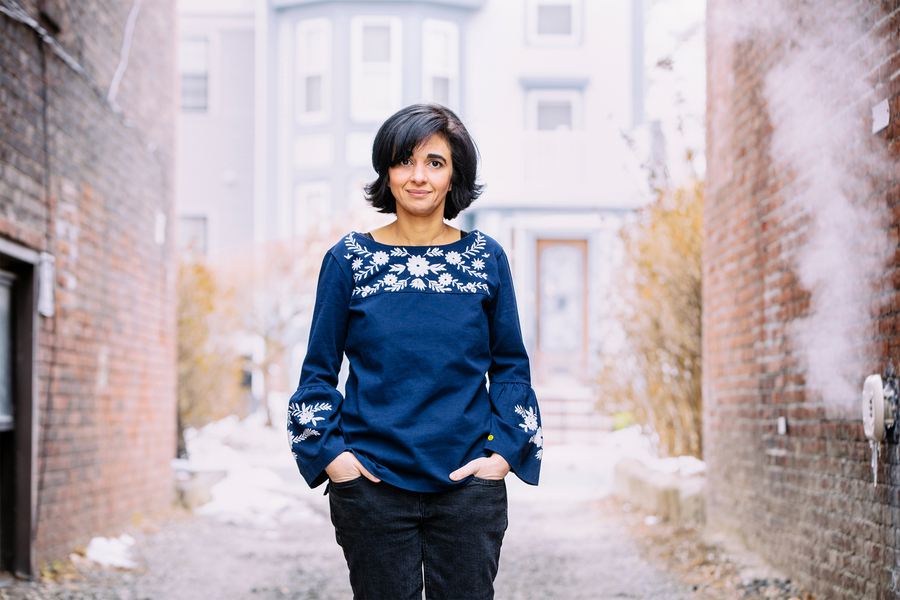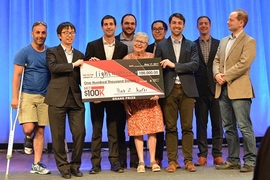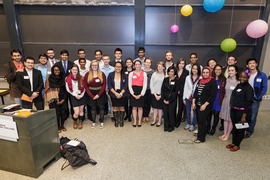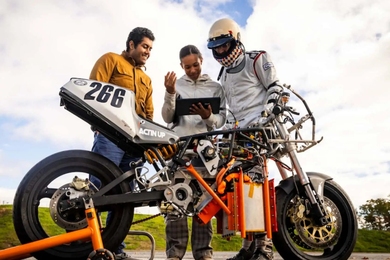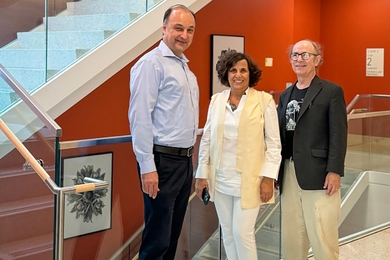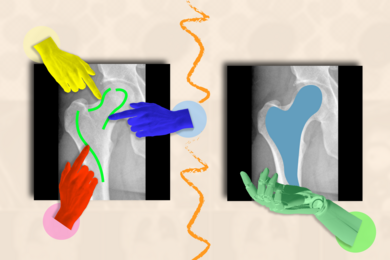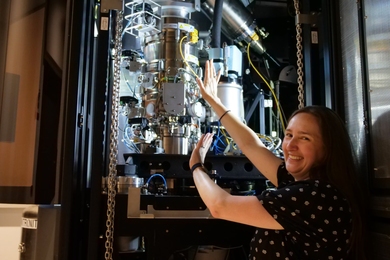Last year, women visiting a neonatal clinic at a hospital in Kiboga, Uganda, began using two waterless, standalone bathrooms that offered a cleaner and more private alternative to the pit latrines that are standard in the region.
The deployment was the culmination of years of work by the startup change:WATER Labs, co-founded by two MIT research scientists — and its success showed the company’s potential to improve lives far beyond Uganda.
Half of the world’s population lacks access to toilets that safely manage human waste, with women and children bearing the brunt of the consequences. A child dies every 15 seconds from water-related diseases like diarrhea and cholera. Women and girls without private bathrooms close to their homes are susceptible to high rates of sexual violence. Globally, 45 percent of schools lack proper bathroom facilities, one reason 20 percent of girls drop out of school by the time they start menstruating.
The small but determined team behind change:WATER Labs believes the solution to these problems is an inexpensive, no-flush toilet that can be dropped into any location and work without external power. The toilet, which the company calls the iThrone, uses a proprietary material to evaporate the water content of human waste, shrinking waste by 95 percent, thus preventing waste discharge and simplifying waste collection.
The breathable material takes advantage of the natural tendency of water molecules to move from areas of high moisture to areas of low moisture. CEO and co-founder Diana Yousef, who is also a research affiliate at MIT, says the iThrone allows for waste collection once or twice a month as opposed to every day, transforming the economics of distributed sanitation in low-resource communities.
“We’re essentially turning human waste into clean molecular water, and what’s left over gets collected much less frequently at much lower cost,” Yousef says. “The solution helps customers managing sanitation to be much more scalable, much more sustainable, and much more profitable.”
Today change:WATER Labs has promising early trial results to go along with support from a host of companies, NGOs, and governments. But back when the company was nothing more than an idea, MIT played a pivotal role in making the iThrone concept a reality.
A unique partnership
The seed of change:WATER Labs was planted for Yousef while working on a water treatment initiative with NASA in 2009. Although the project explored ways to recycle water for space agriculture, Yousef wondered if any of the approaches could be used to improve water sustainability in the developing world.
Five years later, she finally put the idea to paper, pitching an early version at MIT’s Water Innovation Prize and the MIT IDEAS Social Innovation Challenge. The experience helped her connect with others at MIT who were interested in the idea, including co-founder Huda Elasaad, a research affiliate in MIT’s D-Lab. Yousef, who earned her undergraduate degree at Harvard University, a PhD at Cornell University, and MBA and MIA degrees from Columbia University, eventually received seed funding to explore the idea from IDEAS and the MIT PKG Center. The support allowed her team to gain access to lab facilities for early testing.
“[The early support from MIT] was a game-changer for us, because you start to have doubts about whether what you’re doing is possible, and when some other entity like MIT takes a bet on you, you start to believe it yourself,” says Yousef, who notes she didn’t have the resources to pursue the idea on her own and was working on a prototype in her kitchen.
MIT’s relationship with the company has continued to evolve in the years since that early bet. MIT’s Environment, Health, and Safety (EHS) Office has helped the startup develop its waste treatment system, change:Water Labs was named a Solver team with MIT Solve, and the company benefits from its association with MIT D-Lab, where it collaborates with MIT students from diverse backgrounds.
“We’ve been so very lucky to find such support and collaborators at MIT,” Yousef says. “MIT provides a truly unique ecosystem that cultivates partnerships between innovators within and around MIT to catalyze world-changing innovations. Our breakthrough wouldn’t have been possible without the support from D-Lab, EHS, the PKG Center, and our other partners at MIT.”
On a mission for change
Change:WATER Labs’ toilets were used by about 400 people per week in Uganda before the project was cut short by Covid-19. Yousef says the iThrones proved safe, with minimal odor and no leakage, showing they could be placed close to densely populated areas.
“We have the potential to put safe, hygienic, clean toilets in places that are crowded and close to where people are, and that’s been one of the challenges with other solutions, like composting toilets and others, that don’t fit in crowded communities,” she says.
The toilets also reduced daily waste volumes so much that they were able to operate for weeks at a time without being serviced. Overall, Yousef says feedback from users was overwhelmingly positive as the iThrones provided a safer, cleaner alternative to pit latrines located on the top of a remote hill.
Although travel restrictions have put other iThrone pilots on hold, change:WATER Labs has received funding from the Bill and Melinda Gates Foundation, the United Nations Development Program, and the Turkish government to install its toilets in refugee communities in Turkey later this year.
Private companies have also expressed interest, including two large construction contractors looking to put iThrones in low-income homes in Central America, and two Indian companies seeking to put iThrones in port-a-potties and on transportation and maritime equipment.
Yousef says that inbound interest is indicative of the large global need and pent-up demand for better sanitation options.
“We need new solutions that contain and eliminate human waste while also reducing the amount of water that gets consumed, preventing pollution,” Yousef says. “We solve all of that.”
Yousef says the company never would have reached this point without the MIT community, which she commends for embracing her effort even though she is not an alumna.
“MIT’s willingness to open up its community to the innovators around it allows for things to happen that really don’t happen anywhere else,” she says. “It’s special to be here and it’s really amplified what we’re trying to do.”

